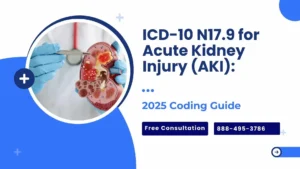UTIs are fairly prevalent conditions, but also medically notable, ranging in severity from minor discomfort to serious infection. Although they are very common, proper coding, and in particular using the ICD-10 coding of N39.0, is very important in diagnosis, treatment, bills, and reimbursement.
Did you know that more than 8 million U.S doctor visits and trips to the hospital are caused by urinary tract infections (UTIs)?
What is UTI and its Complications?
Bacterial infections in the urinary system are among the most popular ones and are associated with urinary tract infection (UTI). Infections are common in women and can spread to any part of the body, including the kidneys, urethra, and bladder. In the case of medical billing and coding, there must be a lot of emphasis on selecting the appropriate ICD-10 code, which will be capable of supporting the clinical setting’s communication, reimbursement, and medical documentation processes. This guide discusses suitable ICD-10-CM diagnosis coding criteria of urinary tract infections, specification of the site of infection, and the application of another code in case of organisms causing infections.
Understanding the ICD-10 Code for UTI :
The following is represented by the code ICD-10 N39.0:
Urinary tract infection, location not given.
This code is for UTI, but there is no evidence that it is in any particular location of the body (for example, the bladder, urethra, or the kidney). It is the typical interim diagnosis in outpatient as well as emergency settings, where no other description is given.
What is ICD-10 Code N39.0?
In situations when the site of the infection has not been indicated in the documentation (put differently, it may be the bladder, kidney, or the urethra), it is preferable to utilize the following diagnosis code:
N39.0– The infection of the urinary parasite is not specified.
This ICD-10 code is widespread in instances where UTI is recorded and no specificity of the location of the infection is mentioned. It is especially applicable when the results of laboratory testing or clinical descriptions fail to establish a particular location of the urinary system site. The term site not specified will be clear without getting information that is not given by the healthcare expert. N39.0 is to be employed in case no discrete point of contamination is registered in the medical record. It is a general code that is applicable in various nonspecific urinary infections where the UTI is indicated.
When to Use N39.0 :
ICD-10 code N39.0: use when:
- There is no site specified (e.g., bladder, urethra, kidney).
- Symptoms are wide-based.
- Preliminary diagnosis Diagnosis Diagnosis is preliminary.
The following situations call for the use of the specific codes:
- Cystitis is identified –> Make use of N30.00 or N30.01.
- The presence of pyelonephritis→ Apply N10.
- Urosepsis is reported -> Combine A41.9 or A41.51.
ICD-10 Common Codes for Infections of UTI :
| Codes | Description |
| N39.0 | Expanded septic focus, the location is not specified. This is the general diagnosis code that would be mostly applied in a situation where the provider does not indicate the location of the infection in the urinary system. |
| N30.00 | Non-hematuric acute cystitis. Utilize it in case a bladder infection is diagnosed, obviously, though there is no blood in the urine. |
| N30.01 | Acute hematuric cystitis. Employ it in UTI cases that encompass blood in the urine and those that take a toll on the bladder. |
| N30.90 | Cystitis, unspecified. This will be applicable in cases where bladder inflammation has been recorded, but not the status of acute, chronic, or hematuria. |
| N10 | Acute pyelonephritis. Select such a code when the kidney is involved, which is usually accompanied by flank pain and a burning sensation. |
| N12 | Tubulo-interstitial nephritis without designation of acute or chronic. Aid in kidney inflammation that has no apparent history or medical reason. |
| Z87.440 | History of UTI. Billing code employed in the recording of frequent UTIs or infections in the past that ended in the ureter or other parts associated with urinary organs. |
The importance of Accurate UTI Coding :
Improper coding on UTI can result in:
- Claim denials or rejections.
- Delayed reimbursement.
- Compliance risks.
- Unreliable records on patients.
Be it acute ICD 10 UTI or chronic ICD 10 urinary tract infection, by utilizing the appropriate diagnosis code, the basis of an effective revenue cycle management is achieved.
In elderly patients, UTIs can present with confusion or disorientation—making it important to understand related codes like R41.0 and R41.82.
Consult a credible Medical Billing and Coding Company, such as Providers Care Billing LLC, to ensure an efficient, streamlined claims process, the avoidance of errors, and all your reimbursements maximized.
Allow our professionals to do the billing, and you concentrate on recovery. Call us immediately and have a free consultation.
📞 Call Now: 888-495-3786
📧 Email: Info@providerscarebilling.com
N39.0 Coding Guides: Diagnosis, Charges, and Causative Organism
Do:
- Where the site is unspecified, use N39.0.
- Provide bacterium-specific codes when the organism is confirmed in lab results.
- Add detail by mentioning things such as acute symptoms or history of recurrence.
- Make sure that the diagnosis codes coincide with the results of urinalysis or imaging.
Don’t:
- Use general codes where specific codes can be used.
- Miss association of symptoms (e.g., hematuria, dysuria) with the correct diagnosis code.
- Bypass DRG conformity or billing requirement in the choice of ICD-10 codes. Use codes without ensuring that they are documented on various sites.
Conclusion :
One of the most common diagnoses in outpatient and primary care settings is UTIs. Proper utilization of ICD-10 Code N39.0 leads to smooth claims, proper medical records, and billing within compliance. It does not matter whether it is a case of frequent UTIs, complex infection, or ensuring the diagnosis code is correct with UTI; precision is the key.
Trust the name of Providers Care Billing LLC to assist you in getting it right on time in Medical Billing Services and Revenue Cycle Management.
FAQS
Q: What is the ICD 10 code of UTI?
The main ICD-10 code is N39.0 for unspecified site infections.
Q: What is the ICD code of recurrent UTIs?
Use N39.0 to document active infection and Z87.440 that reflects recurrence of UTIs.
Q: Is it possible to utilize N39.0 to treat sepsis induced by a UTI?
No. Apply A41.51 (sepsis caused by E. coli) and N39.0.




